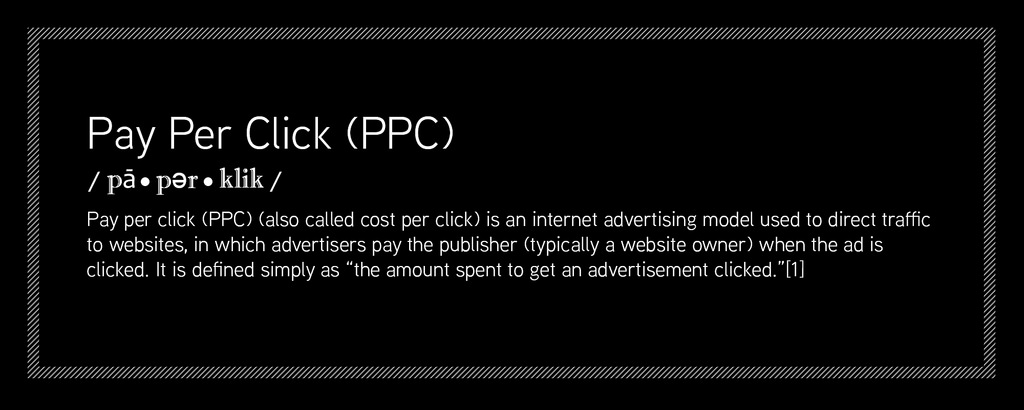
In contrast to, say, SEO (search engine optimization), PPC marketing is a great way to zero-in on your ideal audience. When you’re equipped to better target your audience, you can effectively fine-tune your ad and landing page according to their preferences and needs, which of course, increases the likelihood of ‘converting’.
What is PPC Marketing at its Core?
PPC is essentially an online marketing model – advertisers pay every time their ads are clicked on in the SERPs (search engine results pages) or affiliate sites. So more or less, you’re buying traffic. In some business circles, PPC is also referred to as CPC (cost-per-click marketing), SEM (search engine marketing) or paid search.
Since PPC is a part of SEM, combined with SEO, it is a great way of targeting specific audiences through search engines like Bing and Google; you are in a better position to determine answers to their queries, get other generic information or what kind of products they buy, for instance.
As an advertiser, you only have to pay when you get “ad clicks”. This model has evolved in the last few years and many PPC campaigns use pricing models like CPM (pay per thousand impressions) or CPA (pay when ad clicks lead to conversion).
Why is PPC so Hot Right Now?
Getting online exposure is something every business is fiercely competitive at. And they should be; soon, Google plans to do away with the AdWords sidebar and they will be displayed on the top of the search page.
What this means is if you are not on a PPC model, even if you’re being displayed on top of organic results, you will end up in a low position on the first page, if you show up at all, that is; all the more reason to have a strategic PPC strategy in place.
You’re probably working hard to see better results coming in organic searches – PPC strategies leverage organic campaigns and can have a remarkably positive impact when we talk CTRs (click-through rates). When you think about it for a second, top luxury brands are currently using PPC simply because it generates massive revenue.
At AOK Marketing, we strive hard to devise the best PPC campaigns focused on your unique needs, so you end up on the first page of Google search results every time, while seeing your revenue climb steadily.
Spending on PPC increased by up to 14% last year. Most of Google’s revenue also comes from advertising, highlighting the importance of PPC and how it’s a constantly growing market.
How PPC Stacks up Against the More Traditional SEO Marketing
In stark contrast, SEO is all about organic and unpaid search results. The most ideal position every business strives for in organic search results is being ranked right on top on the first page of search results and a great New York SEO company can make that happen. As an initial goal, all businesses want to and should settle for that first page position.
However, you cannot achieve this by paying the search engines to boost your organic search position; you need to actively work at it and put in the man hours. This organic position is of the essence because each time a user clicks an organic search result, you get a visitor who wants to check out your website. You haven’t paid anything for that visit unless you’ve hired an SEO consultant for this purpose.
Google AdWords accounts for about 90% of PPC ad earnings. AdWords is a very profitable choice due to the high amount of Google’s total search traffic.
PPC marketing is a fairly easy way to promote your website and get the spotlight on your business, especially when snagging that first-page organic search result position is a longer term goal. PPC is an ideal choice when your business wants to target a specific market segment with a unique product or service.
It makes sense to go with PPC when there aren’t that many competitors bidding against your ads, driving up your PPC marketing costs.
Common Features Found in PPC
There are a number of ways to manage your account and ensure you’re getting the desired amount of ‘quality’ traffic. At its core, PPC uses the following features to accomplish this:
- Geo-targeting
- Day-parting
- Device Targeting
- Keyword Control and Relevance
- Demographic Targeting
In the fast-moving online digital space, it simply isn’t enough to market on a mass scale, but rather market to the ideal masses.
Geo-targeting
Advertisers don’t find it feasible to have their PPC ads showing all over the Internet. Geo-targeting lets you target a select audiences within specified geographical parameters. So for example, if you want the ads to be limited to the State of California, or say, a city within the state, you can do so.
Targeting geographic-specific audiences this way guarantees you’re not wasting funds on visitors clicking outside your desired location parameters, and, if you happen to be a local business with a fixed budget, you can make the most of it. This is true for businesses with limited reach. Say, a dentist, can only target dental patients close to his area of practice. Geo-targeting lets him pick the demographics and keywords that best fit his business needs.
Day-parting
Through day-parting, you run ads on specific days of the week or hours of the day; i.e. many B2B companies prefer serving ads during operational hours as opposed to the weekends only.
Monitor your Analytics data and you can determine what days, hours or quarters of the year are most suitable to fuel your PPC campaign, by order of the products and services you have on offer.
Device-targeting
Online audiences can be targeted either through their smartphones or desktop PCs, laptops and tablets. Ads can be served based on what device your visitors are on. And this is necessary, since desktop PC users tend to have different online habits than smartphone users.
Ads that display on mobile devices must appear a certain way, since you have smaller screens and a brief ad copy is required. It is also a well-known fact that people who like to search through mobile devices generally have a shorter attention span. So you’ll need to consider these factors before serving up an ad as it’s going to be notably different from one being served to desktop users.
Keyword Control and Relevance
PPC’s underlying model revolves around keywords. And it’s important to know this in order to understand how ads are displayed. For instance, when it comes to Sponsored Search, the advertisers’ ads are displayed only on the basis of the query keyed-in by visitors.
Keywords are still involved within the Display Network, though that’s not exactly how ads are displayed – website pages having certain keywords within the Display Network. This is what determines relevancy in terms of ads containing either the exact same or similar verbiage.
When we talk about PPC account management for textual ads, keywords get organized in industry-specific groups according to relevance. That’s when ads are tailored specifically to center around those keywords. Once this ensues, the ads link up directly with landing pages matching the ad copy’s verbiage.
Demographic Targeting
The Display Network lets you target highly specific audiences based on demographics like age, job title, parental status, gender, interests or household income. These demographics are determined through cookies.
Each time a visitor arrives on sites within the Display Network’s proximity, they receive a cookie which tracks their online browsing habits. Since these cookies are merely attached to the user’s PC or mobile device, it’s more of a hit-and-miss affair rather than highly accurate data and facts.
How One Business Capitalized on PPC
Let’s take a look at a real-world case study of how EZLinks Golf was able to implement a proper PPC strategy to boost revenue.
EZLinks Golf boasts a website where golfers schedule tee times at private, public and semi-private golf courses all throughout the US. Success was not easy, since EZLinks was competing against many established names in the industry.
Here’s what the PPC strategy entailed:
- Develop exciting promotions to improve general appeal of the PPC ads
- Adjust scope of campaign based on ‘seasonality’ in the various US regions
- Dense user relevance achieved through highly granular targeting
- Tune and optimize campaigns to meet with ROAS (return on ad spend) while steadily driving revenue up
Some of the key tactics they used:
- Build a detailed campaign through granular targeting, based on golf course locations in the EZLinks Golf network
- Managed almost 3 million keywords to account for client’s tee time inventory and geo-targeting profile
Two Useful Tactics to Gear for Success with PPC
1 – Remarketing
There can be several reasons why people leave your website without converting. Many a times, it has little to do with your page or even your product/service.
It could be a matter of timing as well. Sometimes, visitors get distracted by social media, their email, Skype etc. Maybe something at work might have drawn their attention right when they were about to convert.
As luck would have it, this is where it stops – people leave and don’t really bother coming back. However, that’s not to say they are not interested at all; what you need to do is remind them.
Place a cookie on their browser. This is one way to make sure your brand is staring at lost visitors in the face and reminds them just how great you are.
This is a truly effective way of improving your PPC advertising performance. If done right, PPC can boost your sales by over 120% through remarketing. We have done it for many of our clients and can do it for you as well. Get in touch with us today to talk about PPC. We provide free consultation and can be reached at 1.888.566.2577.
2- An Ad-copy That Really Stands Out
Don’t underestimate what standout ad copy can do for you, even though it is rare. It is known that there are multiple ads trying to, in fact, address the very same search indent, but have you really come across it that often on Google?
If your ad copy fails to stand out from the competition, your target audience has little motivation to click those ads. Find ways to draw more attention. For example:
- Come up with new ways to address similar pain points or new ones
- Highlight a thing or two that makes your business unique
- Establish an emotional connection with visitors
- Including numbers is always good
- Use some form of exclusionary criteria
- Try anything at all that comes to mind, to make your ads uniquely stand out
This is not to say that your audience won’t be focused – you need to still drive only quality traffic to landing pages through your ad copy. It’s never a good idea to choose traffic volume over traffic quality.
All of this might seem fairly standard stuff, though you’d be surprised how rare ad copy really is. If you do this right, you’re getting a lot more quality traffic flooding your landing page.
Creating Lead Generation through PPC Campaigns
In your drive to generate leads through paid traffic, there are a number of strategies you can employ. Before anything else, ask yourself:
- What’s feasible for MY business?
- What are my highest-rated profit-generating products/services?
- What’s my close rate?
- What kind of volume can I handle?
- What is the ALV (average lifetime value) of each client?
- How does branding tie in?
Answer the above and you can chalk out a paid search objective. After launching your campaign and gathering initial data, refine your methods more through “A/B testing landing pages” for example, to use PPC for reeling in the kind of leads that generates more business and profit.
PPC Guide: Future Outlook
Experts may claim that the future of PPC appears somewhat bleak at first glance; competition and CPCs are constantly on the rise, ad inventory can be flat and even shrinking in certain cases, and then there’s those pesky ad blockers trying to knock down ROI.
It sounds like a real downer, but PPC’s future is quite bright, contrary to what some industry experts are banking on. Upcoming trends are markedly changing PPC’s future in the digital marketing sphere and you need to get ready to adapt to unique tactics to get the most out of PPC marketing in the coming years.
The AOK PPC Marketing Solution
At AOK Marketing, we’re managing more than 500 individual Google AdWords accounts for businesses of all calibres and scope. Since we’re a certified Google Partner, we adhere to nothing but the highest performance standards when it comes to managing your PPC campaigns.
We cater to all your PPC needs and deliver the best results in 120 days. Any campaign or account we set up, you’ll always have full access to it and can take it anywhere with you, even if you decide to part ways. Just some of the benefits you enjoy with our PPC management services:
- A dedicated account manager
- Keyword research
- Account structuring/restructuring
- Advanced bid management
- Dynamic key phrase insertion
- Geo-targeting
- Landing page optimization
- Full transparency; you have round-the-clock access to your account
Choose the Right Partner and See Real Results
When you partner up with a digital marketing firm like ours, you are getting years of real-world experience with managing PPC campaigns for a slew of companies, no matter how big or small. Our past successes are a testament to our value-driven service.
Explore your options with us today and see what the power of a well-orchestrated PPC campaign can mean for your business. Call 1.888.566.2577 to speak to one of our representatives today.
About The Author
Dave Burnett
I help people make more money online.
Over the years I’ve had lots of fun working with thousands of brands and helping them distribute millions of promotional products and implement multinational rewards and incentive programs.
Now I’m helping great marketers turn their products and services into sustainable online businesses.
How can I help you?





